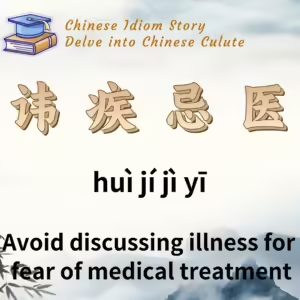
Chinese Idiom: 病入膏育 (Bing Ru Gao Huang)
English Translation: Illness has entered the vital organs
pīn yīn: bìng rù gāo huāng
Idiom Meaning: This idiom refers to a disease that has progressed to a point where it cannot be treated, or it can be used metaphorically to describe a situation that has developed to an irreparable stage. “膏” (gāo) refers to the fat around the heart, while “肓” (huāng) indicates the area above the diaphragm and below the heart, traditionally seen as vital for health.
Historical Source: Zuo Zhuan (《左传 ·成公十年》)
Idiom Story:
In 581 BC, after the wrongful execution of his ministers Zhao Tong and Zhao Kuo, Duke Jing of Jin was haunted by guilt. Troubled by his conscience, he began to experience severe anxiety and nightmares. One night, he dreamt of a ghostly figure accusing him of murdering its descendants and vowing revenge. Terrified, the duke fled to his bedroom, but the apparition followed him.
As a result of his intense psychological distress, Duke Jing fell gravely ill. He summoned physicians from across the country, but none were able to help him. Eventually, he sent for a renowned doctor from the state of Qin named Bian Que.
Before the doctor arrived, Duke Jing had another peculiar dream. In this dream, he saw two tiny figures emerging from his nose, conversing at his bedside. One warned the other about the impending doctor’s arrival, suggesting they hide above the diaphragm and below the heart, where the doctor could not reach them.
Just then, someone announced that the Qin doctor had arrived. Upon examining Duke Jing, Bian Que quickly shook his head and declared, “This illness cannot be treated. It resides above the diaphragm and below the heart, and conventional methods cannot reach it.”
Hearing this, Duke Jing recognized the significance of his earlier dream and praised the doctor’s expertise. However, shortly after, he was tempted to eat freshly harvested wheat. After eating, he experienced severe abdominal pain and tragically died in the restroom.
From this story, the idiom “病入膏肓” emerged, symbolizing a state of irreversible illness or a situation beyond redemption.






